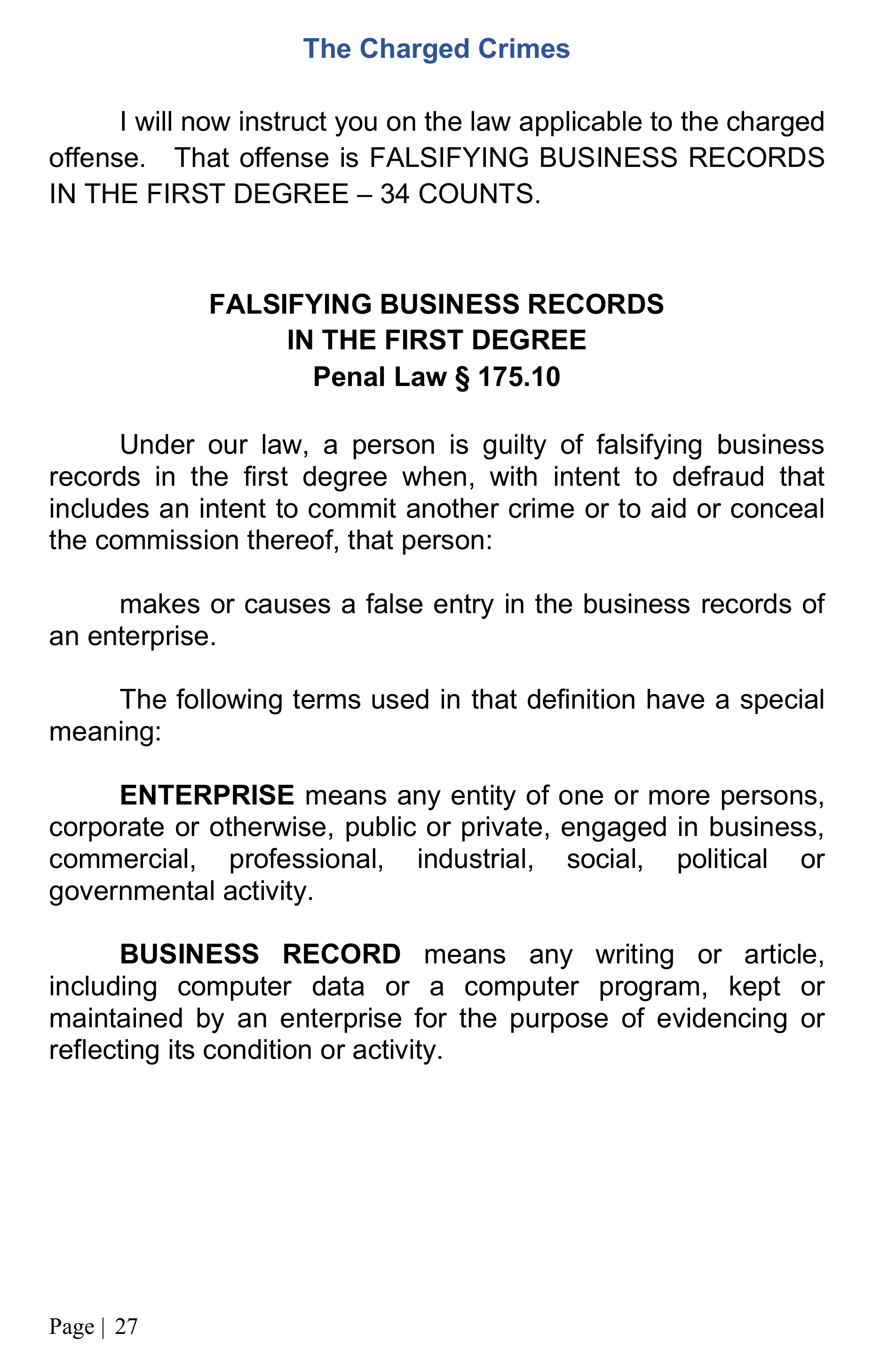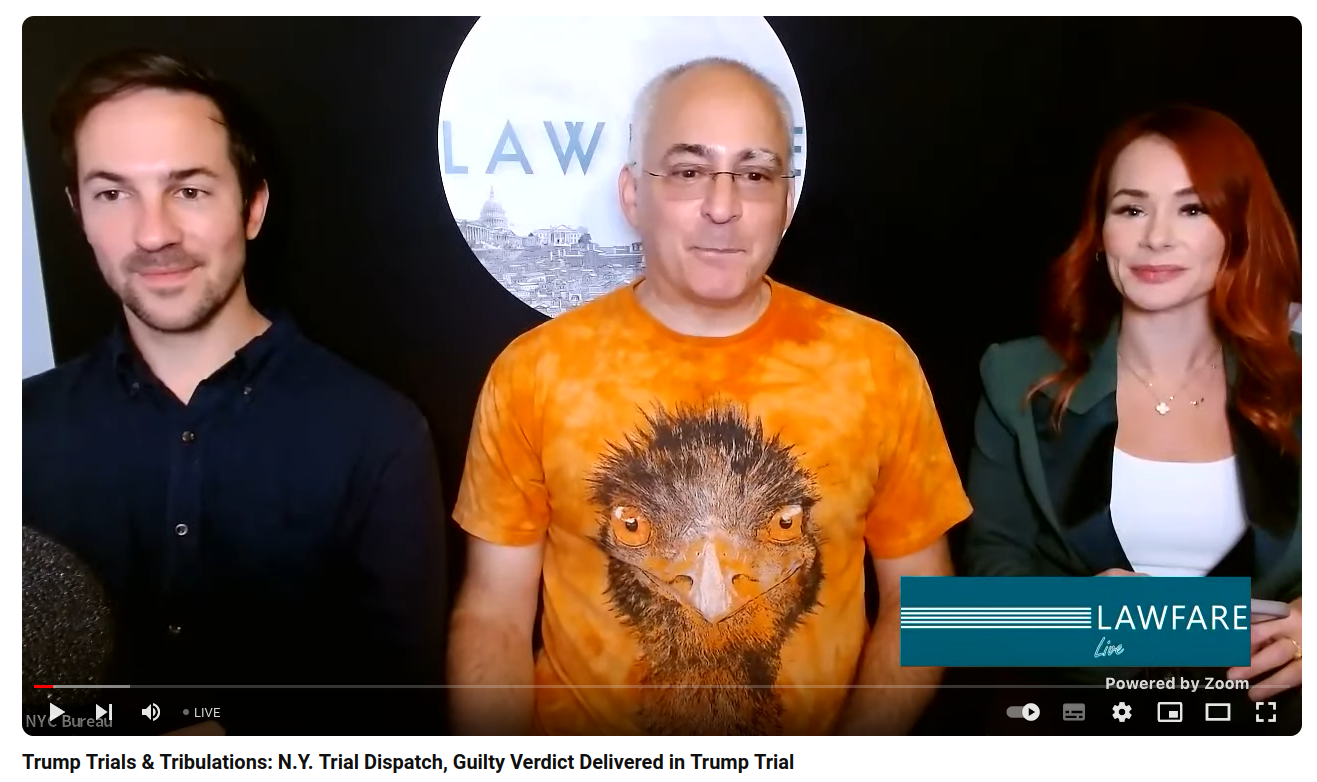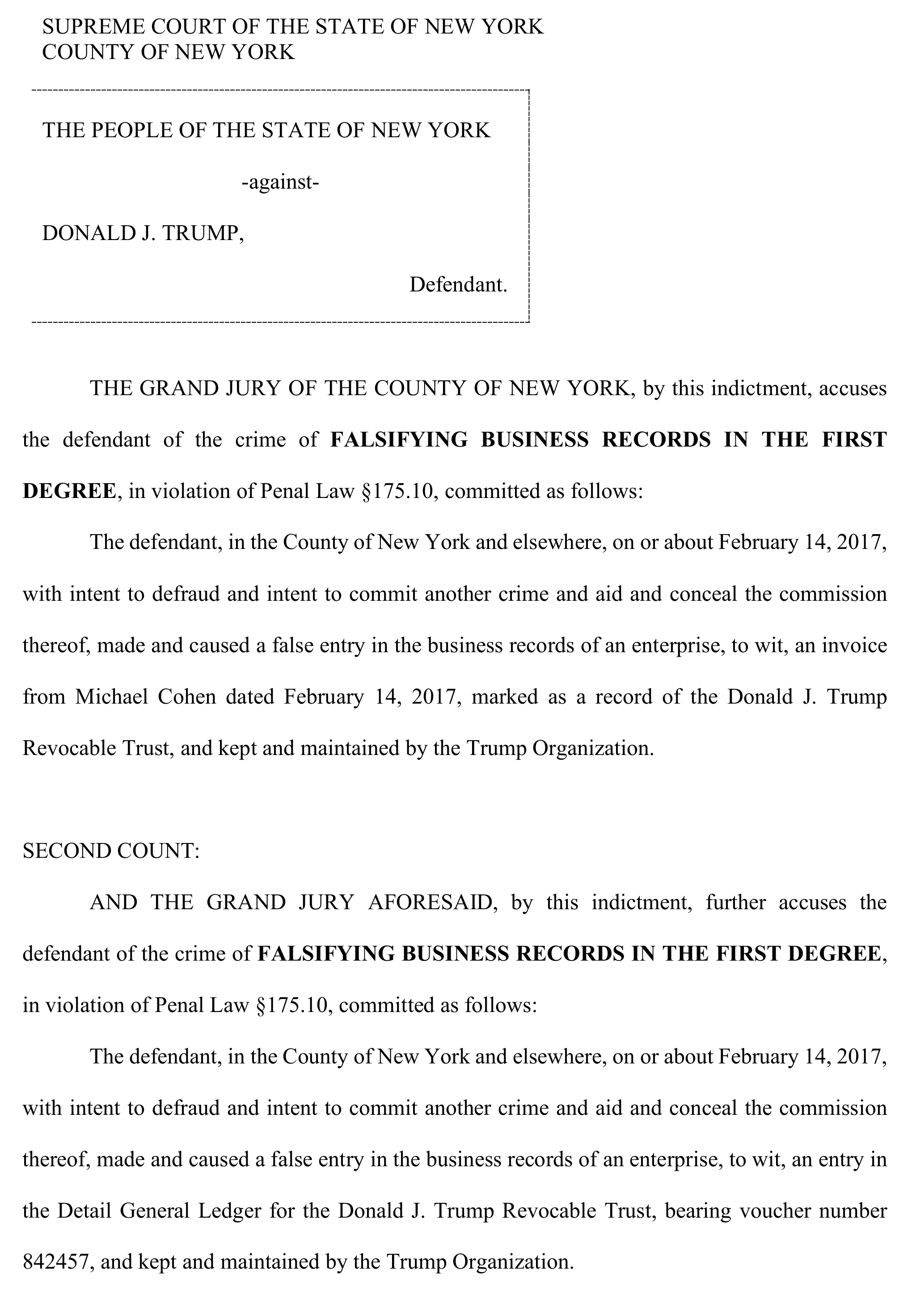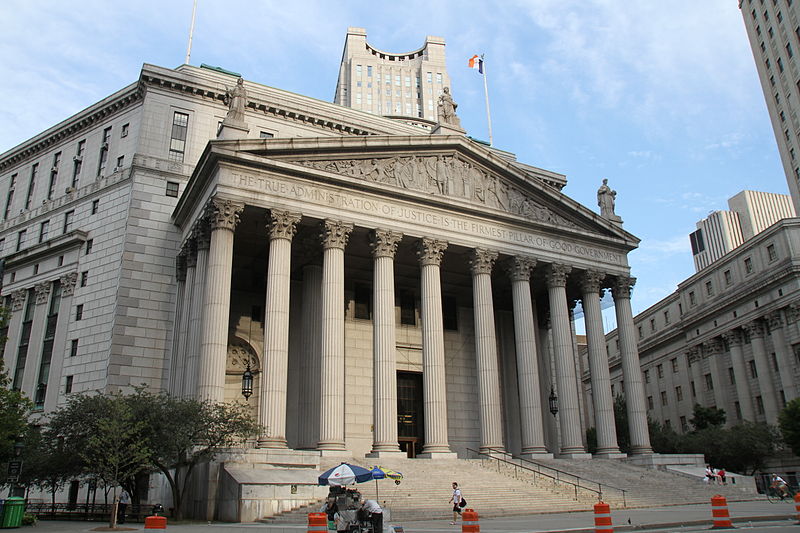Dort:

https://www.nycourts.gov/LegacyPDFS/press/PDFs/People%20v.%20DJT%20Jury%20Instructions%20and%20Charges%20FINAL%205-23-24.pdf (via Anna Bower [Lawfare])
gibt es die 55-seitigen rechtlichen Hinweise des Richters, auf deren Grundlage die Jury entscheiden sollte:
„Members of the jury, I will now instruct you on the law. I will first review the general principles of law that apply to this case and all criminal cases.
You have heard me explain some of those principles at the beginning of the trial. I am sure you can appreciate the benefits of repeating those instructions at this stage of the proceedings.
Next, I will define the crimes charged in this case, explain the law that applies to those definitions, and spell out the elements of each charged crime.
Finally, I will outline the process of jury deliberations.“
Verglichen mit den drei anderen Strafverfahren gegen Trump – zwei wegen des Versuchs das Präsidentschaftswahl-Ergebnis von 2020 zu kippen und eines wegen der staatlichen Geheimakten, die er noch nach dem Amtsantritt Bidens in seiner residence in Florida aufbewahrte – war der Gegenstand des heutigen Urteils vergleichsweise unpolitisch:
Er wurde verurteilte, 34 business records gefälscht zu haben (das heißt: Schweigegeldzahlungen nicht als solche verbucht zu haben; criminal trial verdict sheet [listet die 34 Punkte auf]), um damit andere Straftaten (in Betracht kamen Verletzungen von Wahlkampffinanzierungs- und Steuernormen) zu verdecken.
Die als solches rechtmäßigen Schweigegeldzahlungen flossen an eine Unternehmerin und Darstellerin in der Pornofilm-Industrie, die im Gegenzug über Sex mit Trump schweigen sollte.
Das Strafmaß wird am 11. Juli vom Richter verkündet (Hugo Lowell [The Guardian]).
Deutschsprachiger Vorab-Bericht in der Legal Tribune Online von gestern (Mittwoch):
Entscheidung im Strafprozess gegen Trump erwartet
https://www.lto.de/recht/nachrichten/n/trump-strafprozess-schweigegeld-wahlkampf-jury-cohen-blanche/.
Auf Englisch vorab z.B.:
It’s not just guilty or not guilty. Here are all the possible outcomes of the Trump trial
https://www.politico.com/news/2024/05/27/trump-trial-possible-outcomes-00160042.
The prosecution and the defense used their final appeals to the jury to paint two very different portraits of [Trumps Ex-Anwalt und Belastungszeugen] Michael Cohen
https://www.politico.com/news/2024/05/28/trump-trial-closing-arguments-michael-cohen-00160319.
Nach dem Urteil:
Trump Trials & Tribulations: N.Y. Trial Dispatch, Guilty Verdict Delivered in Trump Trial

https://www.youtube.com/live/yx-Nz-Flqdg
PS.:
Die 16-seitige Anklageschrift, die die 34 Anklagepunkte etwas genauer beschrieb als das o.g. criminal trial verdict sheet:

https://manhattanda.org/wp-content/uploads/2023/04/Donald-J.-Trump-Indictment.pdf via Der Spiegel
Ungenau ist die folgende Behauptung in den Spiegel-FAQ:
„Das Schweigegeld, dessen Vertuschung und die Fälschung von Geschäftsunterlagen sind aber erst dann illegal, wenn sie einer anderen Straftat dienen.“
Vielmehr stuft der Bezug auf eine andere Straftat die business record-Fälschung vom Vergehen (misdemeanor) zum Verbrechen (felony) hoch, auch wenn Trump im vorliegenden Fall wegen des bloßen Vorgehens nicht verurteilt werden konnte, weil er anscheinend vorzog auf alles (Freispruch) oder nichts (Verurteilung wegen Verbrechens) zu spielen:
„There are a number of ways the jury could come to the decision that Trump is not guilty on all 34 counts: They could find that Trump didn’t make false business records or cause others to make them; that he made them but not with the intent to defraud; or that he made them with the intent to defraud but not in service of committing or covering up an underlying crime. The jury can’t choose to convict Trump on the third option, though technically a misdemeanor crime in New York, because Trump’s lawyers didn’t request that the jury instructions include ‚lesser included offenses,‘ which would have allowed the jury to weigh misdemeanors.“
https://www.politico.com/news/2024/05/27/trump-trial-possible-outcomes-00160042
㤠175.05 Falsifying business records in the second degree.
A person is guilty of falsifying business records in the second degree when, with intent to defraud, he:
1. Makes or causes a false entry in the business records of an enterprise; or
2. Alters, erases, obliterates, deletes, removes or destroys a true entry in the business records of an enterprise; or
3. Omits to make a true entry in the business records of an enterprise in violation of a duty to do so which he knows to be imposed upon him by law or by the nature of his position; or
4. Prevents the making of a true entry or causes the omission thereof in the business records of an enterprise.
Falsifying business records in the second degree is a class A misdemeanor.“
(https://law.justia.com/codes/new-york/2022/pen/part-3/title-k/article-175/175-05/ via https://www.politico.com/news/magazine/2024/05/24/trump-trial-verdict-00159676)
㤠175.10 Falsifying business records in the first degree.
A person is guilty of falsifying business records in the first degree when he commits the crime of falsifying business records in the second degree, and when his intent to defraud includes an intent to commit another crime or to aid or conceal the commission thereof.
Falsifying business records in the first degree is a class E felony.“
(https://law.justia.com/codes/new-york/2022/pen/part-3/title-k/article-175/175-10/)
PPS.:
Reaktionen aus der Republikanischen Partei (via Der Spiegel: Reaktionen auf Trump-Urteil)
My statement on President Trump trial verdict:
Today is a shameful day in American history. Democrats cheered as they convicted the leader of the opposing party on ridiculous charges, predicated on the testimony of a disbarred, convicted felon. This was a purely political…
— Speaker Mike Johnson (@SpeakerJohnson) May 30, 2024
The verdict is a travesty of justice.
The Manhattan kangaroo court shows what happens when our justice system is weaponized by partisan prosecutors in front of a biased judge with an unfair process, designed to keep President Trump off the campaign trail and avoid bringing…
— Rep. Jim Jordan (@Jim_Jordan) May 30, 2024
Today’s verdict represents the culmination of a legal process that has been bent to the political will of the actors involved: a leftist prosecutor, a partisan judge and a jury reflective of one of the most liberal enclaves in America—all in an effort to “get” Donald Trump.
That…
— Ron DeSantis (@GovRonDeSantis) May 30, 2024



